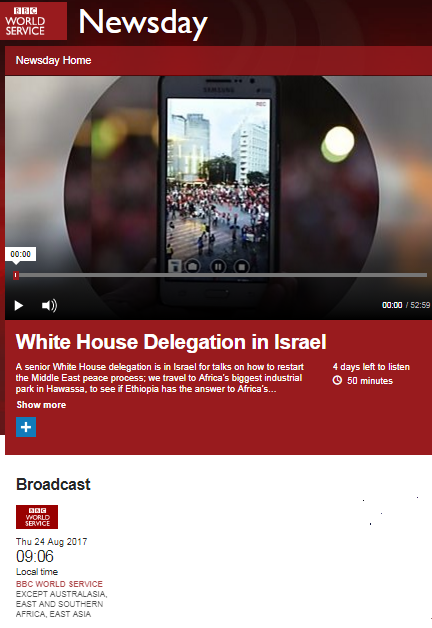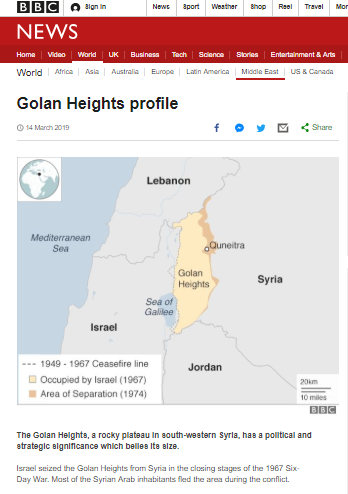As we saw in part one of this post, on August 24th the lead story in the early edition of the BBC World Service radio programme ‘Newsday‘ related to a visit to the Middle East by a US delegation.
That item presented an unchallenged, one-sided view of negotiations between Israel and the Palestinians from a former PLO employee and steered listeners towards the belief that the main issue at stake is ‘settlements’, as well as promoting partisan views of ‘international law’.
A later edition of the same programme on the same day also led with that story but if listeners were expecting to hear a balancing viewpoint from the other side, they would have been sorely disappointed. Presenter Lawrence Pollard introduced the item (from 00:21 here) thus: [emphasis in italics in the original, emphasis in bold added]
Pollard: “Now let’s talk about the job facing the advisor in chief and son-in-law to the president, Jared Kushner. Can he pull the rabbit out the hat; broker a peace deal between the Israelis and the Palestinians? There’s a US delegation led by Mr Kushner in Egypt, Jordan. Ah…they’re in Israel now and they’re going to pick up with separate negotiations with the Israeli and Palestinian leaderships. Ehm…what are the prospects? A little earlier we caught up with Omar Baddar, the deputy director of the Arab-American Institute in Washington. I asked him what kind of coverage this trip was getting back in the US first of all.”
Clearly that introduction does not comply with the BBC editorial guidelines on impartiality requiring audiences to be informed of the “particular viewpoint” of interviewees. Pollard made no attempt to clarify the political agenda of either his guest or the organisation he represents and so listeners remained unaware that they were hearing partisan ‘analysis’ from a ‘one-stater’ who – like the head of his organisation – supports the anti-Israel BDS campaign.
Omar Baddar began by promoting the notion that the US delegation’s latest visit to the region is related to domestic events in America – despite the fact that the US officials concerned have previously made numerous similar trips.
Baddar: “Well to be honest with you, I don’t think many people are talking about this in America. I mean the president has gotten himself in such hot water over domestic issues with racism and violence that this is not really on anybody’s radar, which is why precisely I think he is attempting this push; to get some kind of positive media coverage about some kind of foreign policy success on the peace process front for the Israelis and Palestinians. Unfortunately, I don’t think he’s got anything real or substantive going on so I don’t see how this is actually going to generate what he’s attempting to go after. I think this is going to be just another failed venture of this president.”
Pollard: “Some of the headlines are extraordinary; sort of anti-Trump.’Trump defends neo-Nazis’ was one headline on an Israeli newspaper. In the region, how is the visit being seen?”
Baddar: “In terms of how governments in the region are viewing this, I think most of them are just distracted with much other, you know, with many other issues; regional dynamics vis-à-vis Iran and other things. But the Palestinian Authority in particular I’m sure is very, very frustrated because they’ve been stroking Trump’s ego out of desperation, telling him that he’s the president with the boldness and courage and vision to resolve this conflict in the hopes that he would apply some kind of meaningful pressure on the Israelis to sort of show progress towards ending the occupation and stop settlements and so on. None of that pressure is actually coming from the Trump administration so they’re finally seeing this for the PR stunt that it is and they simply have no interest in playing along with it.”
Pollard: “Do you detect a policy, a new idea, a new direction at all coming…coming out of Washington?”
Baddar: “I do not at all. I think he’s a man with no vision whatsoever and I think that’s the real reason behind the mixed messaging he’s been providing on this issue. When it comes on to specifics and the kind of people he’s surrounded himself with, none of them are the kind of people who understand what it actually takes to resolve this conflict so I don’t see anything to be hopeful about.“
Pollard: “Ah…interesting. Tell us more about the position, as you see it, of the Palestinian Authority. You say that there they are sort of stroking Mr Trump’s ego out of desperation.”
Baddar: “That’s pretty much the case. I mean, look, they’ve…the Palestinian Authority has bent over backwards to accommodate every Israeli demand but the Israelis have taken everything the PA has offered but have not really offered even a slow-down in settlements in return or anything like that. So what is needed is…you know, President Obama did not really go very far but he at least spoke some truths about this stuff. And in the case of President Trump, he’s not even going nearly as far as Obama did. So what we need more of we’re getting significantly less of. Abbas at this point is actually expressing some level of frustration with the US administration, which is not something that we’ve really see from him in the past.”
One would have expected to see Pollard to remind listeners at this point that when – at the request of the Obama administration – Israel froze construction in communities in Judea & Samaria for ten months in 2009/10, the Palestinian Authority refused to come to the negotiating table throughout 90% of the period.
Pollard: “And at the moment does the Israeli prime minister Binyamin Netanyahu have the head space to deal with this? He’s got lots of internal political problems of his own at the moment.”
Baddar: “Yeah. Internal political problems of his own and also complications in dealing with Trump because he sees him as a very useful ally but at the same time, with the kind of comments that Trump has been making about Nazis and white supremacists in the US, I’m pretty sure that Netanyahu is not in a great position either and he’s…his political base is always based on [unintelligible] more rejectionist when it comes to any kind of compromise with the Palestinians.”
Pollard: “And how much does this stuff matter in America? How will it be treated on the networks do you think?”
Baddar: “Not as much as it should. I think America is pretty…pretty occupied right now with the drama that President Trump has created domestically that this is not even on their radar at all. But it really ought to be because in the long-run this is one of those issues that really affects America’s position in the region in a very, very significant way.”
Pollard closed the item with the promotion of some questionable linkage between the US delegation’s visit, internal US affairs and (yet again) an unconnected headline in a specific Israeli newspaper.
Pollard: “Speaking from the Arab-American Institute in Washington that was Omar Baddar. Meanwhile, more background to this visit: four prominent US Jewish groups have announced they will not take part in what has become a yearly call between the president and hundreds of rabbis across the country ahead of the Jewish high holidays of Rosh HaShana and Yom Kippur. They said his remarks around Charlottesville lacked moral leadership and empathy for the victims of racial and religious hatred. Of course that story has been getting a great deal of attention in the Israeli press as well. ‘Trump defends neo-Nazis’ was one headline a couple of days ago. So; the visit of Jared Kushner complicated by so many factors.”
Again we see that ‘Newsday’ coverage of this story focused on promoting the notion that ‘settlements’ are the main issue stalling the ‘peace process’, with no mention at all of relevant topics such as terrorism, the absence of a uniform Palestinian leadership, Hamas’ refusal to accept the existence of Israel in any shape or form or the Palestinian Authority’s payment of salaries to terrorists.
With both interviewees in the two items coming from the anti-Israel side, the complete absence of any mention of such topics is of course hardly surprising but obviously ‘Newsday’ cannot possibly claim to have covered this story in an accurate and impartial manner that meets its public purpose of helping audiences to understand the issue.
Related Articles:
BBC WS Newsday’s one-sided ‘peace process’ reporting – part one




